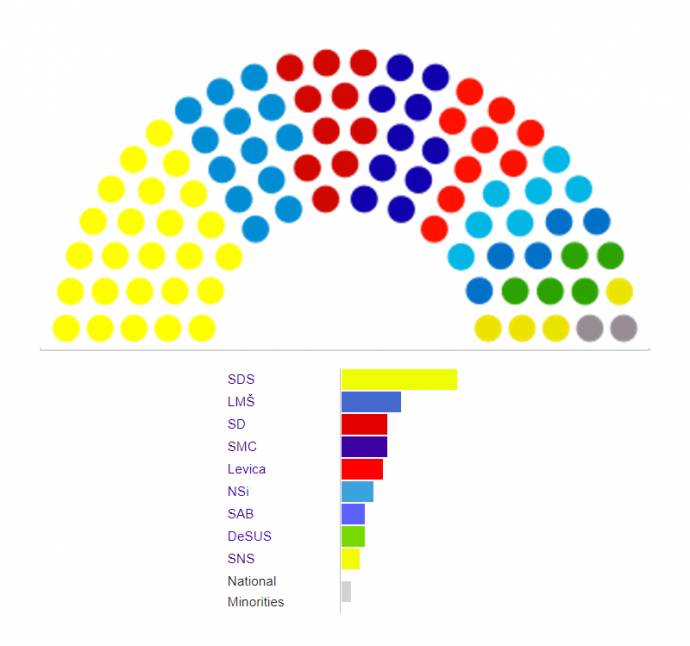The SDS is open to cooperation with "all political options" with which it could find common ground on their platforms, Danijel Krivec, who leads the largest deputy group, told the press after meeting Pahor.
Pahor and Krivec discussed various options to form the government, with Krivec telling him the SDS supported its leader Janez Janša as the prime ministerial candidate.
Janša had said on several occasions he would renounce the post of the prime minister-designate if any other party secured sufficient majority to form the government.
Immediately after the snap election, LMŠ leader Marjan Šarec launched talks on a possible coalition with four centre-left parties and a centre-right one.
Today, LMŠ deputy group head Brane Golubović asked Pahor to wait until Friday for the LMŠ to complete the talks and conduct another round of consultations before nominating a prime minister-designate.
"Then we'll have much more information," he said about the LMŠ-sponsored talks with the Social Democrats (SD), Modern Centre Party (SMC), Pensioners' Party (DeSUS), Alenka Bratušek Party (SAB) and New Slovenia (NSi).
Nevertheless, Golubović said the LMŠ had no problem with Janša being nominated prime minister-designate.
Igor Zorčič, the deputy faction leader of the SMC, also expects the coalition agreement to be largely harmonised by the end of the week.
He noted as he spoke to the press after meeting Pahor that the votes of the centre-right NSi would be crucial to form a new government.
While the SMC has decided to enter a centre-left coalition, the NSi being part of such a coalition is no problem for the party, explained Zorčič.
A coalition with the Left would also be acceptable, but this does not mean that less effort to harmonise different platforms would be needed, he said.
Zorčič believes that if the NSi actually contributed votes for Šarec, "we'd be much closer to what a new coalition and new government would look like".
The SD is also in favour of Šarec, its deputy faction leader Matjaž Han told Pahor, however, its final decision will depend on the coalition agreement.
Speaking to the press after meeting Pahor, Han said he and Pahor shared a view that "the situation is not easy" and that it would be hard to form any kind of government.
He admitted though that putting together a coalition of six parties was "extremely difficult", pointing to the fact there were centrist parties plus a centre-right party and a centre-left one involved.
Asked about the possibility of a five-party government without the NSi which would however be supported by the Left from the opposition, Han said he was in favour of "a clear-cut government coalition" where all parties share the same responsibility.
"It is very easy to support good projects from outside and then blame everyone else when it gets hard," he said.
Meanwhile, the Left's deputy faction leader Matej T. Vatovec told Pahor the party did not support Janša or Šarec as prime minister-designate.
Stressing they were not involved in the LMŠ-sponsored talks, Vatovec said the Left was "no reserve wheel to be used when the main one has broken down".
He said the Left would like the coalition talks to result in a government that would make an effort to eliminate poverty and stir the country towards development.
Asked whether the party's stance on supporting Šarec could change, Vatovec said this was rather unlikely.
He also said Šarec's offer for the Left to work with his government on a project-to-project basis would be voted on by party bodies.
Pahor will continue the consultations on Tuesday by meeting the deputy group leaders of the NSi, SAB, DeSUS, National Party (SNS) and minority MPs.







